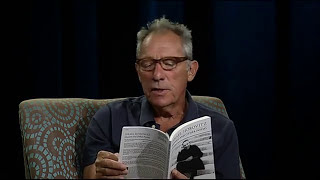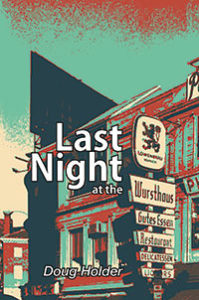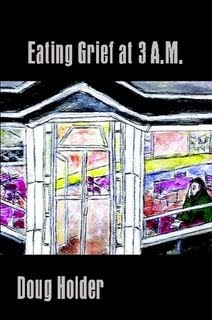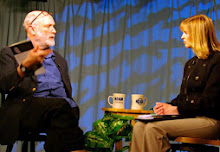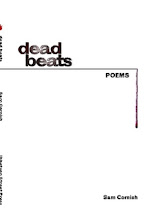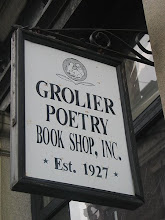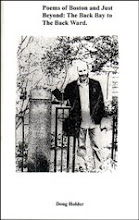Thursday, February 15, 2018
Susan Tepper Interviews author Alex M. Pruteanu
Susan Tepper Interviews author Alex M. Pruteanu
Susan Tepper: Every book of note that I’ve ever read has one line that cements the heart of the story. In your new novel The Sun Eaters it is this line:
Everything that was alive was hungry, always.
Alex M. Pruteanu: I can certainly speak to that. Hunger gives a certain kind of clarity and awareness of everything around you. The senses, all of them, are almost working overtime. You’re ultra-aware of your biology and how it’s changed, of your digestive system in particular.
To get back to this idea that everything that was alive was hungry, always. If you look around at whatever is left of nature, you’ll see that every animal is engaged actively and aggressively in finding food. Everything about an animal’s life from the time it opens its eyes involves hunting/gathering/scavenging for food. It’s daily warfare. Finding food is what they all do every day of their lives.
ST: And, conversely, warfare brings hunger to those who manage to stay alive.
In the narrative you wrote:
Our hunger was chronic… Every spring we would forage for dandelions and nettles. Dandelions were bitter in the summer and autumn, but if we plucked them while they were young, in the spring, they had a sweeter taste… We ate everything from the flower all the way down to the root… Nettles were tricky… Their leaves bit back…
AP: I thought about the immense difficulty a person has to face if he or she is engaged in the never-ending battle of finding food on a daily basis. Food that doesn’t exist or isn’t much available. Imagine living a life like that. Being in competition with not just your fellow humans, but every living thing around you, every animal, to merely find food for the day.
ST: I’ve read tidbits about your own life, from time to time, in other interviews. I know you were born in Romania and emigrated to the states at some point. Can you tell us how your origins helped craft The Sun Eaters.
AP: I was born in Bucharest, Romania in 1969. My mom defected to the States in 1979 and after close to a year of working to obtain our passports, my father and I were let out of the country to come join my mom here as political refugees. I arrived in the States in late January, 1980.
ST: You were eleven years old. How did it feel to leave your homeland? Was it easy for a boy just entering puberty to connect with American kids?
AP: It felt wrong to leave, initially, and beyond. I was basically told that we were leaving, not asked. And I was kept in the dark about the plan of my mother's defection, so it came suddenly for me. As I knew it, she had taken a trip to the United States as part of an economic delegation, and she never returned. In Romania, I had social connections and a lot of friends that I was told I'd have to leave behind. Plus, from the time my father applied to have our passports released and get permission to leave the country for good, I became sort of a cancer. People didn't much feel like being associated with both my father and I. Everyone was being watched/monitored by the secret police, so being associated with someone who was applying to leave for good and join a person who had defected— which officially meant that treason was committed by the defector— was not in the best interest of those staying behind.
ST: It must have been terribly strange and stressful for a child.
AP: When it became official that my father and I were trying to leave the country, my friends backed off. It was a strange period. At one point, I didn't even have to go to school. As I remember it, I went anyway, but I wasn't really part of the class anymore. I wasn't given tests or projects to complete. I didn't get any more grades on anything. I would just go and sit in class. It was all surreal.
ST: Extremely. There are points in The Sun Eaters that are also quite surreal. The two brothers live with their mother in a decimated Eastern European village populated by women doing the labors of men. The men, including their Da, have gone to war and not come back. An exchange between the older brother, Vladi, and their mother begins:
“I dreamed of bird-fish, Ma. They howled and wailed and whistled hot flames from their lips. There were so many it got dark. I couldn’t see.”
“Those are airplanes, Vladi. Don’t be scared. Come to me.”
This dialogue, I believe, is unconsciously lifted, part and parcel, from your own uncertain path as a child who was forced to leave home and country.
AP: Probably. I recall vividly the times I spent (vacations/holidays) at my paternal and maternal grandparents’ homes, which were both in villages in the countryside, although my maternal grandfather had a country house, but just on the outskirts of Ploesti—a town that was bombed by the Allies in WWII due to its several working oilfields (for some time during WWII Romania was allied with Germany).
ST: Perhaps that is what stirred up the section of the book that concerns their visit to the enigmatic and mysterious Uncle Miki who does have food and other luxuries.
Your narrator tells us:
Because of its oil fields and refineries, Uncle Miki’s city was under siege nearly the entire duration of the war… bombed from above by bird-fish every day, so Uncle became part of an invisible force of resistance… Vladi said he was a resistance administrator… he would shuttle very important papers sewn in the lining of his coat…
Secret agents, another dark unfolding in the plight of humankind.
AP: A lot of material in the novel is written from recollections of “adventures” I had as a young boy with friends I had made during my times spent in the countryside. As I recall, one of the toughest inconveniences was having to use an outhouse quite some ways away from the house, and in winter. Winters in Romania are notoriously tough; the country lies on the same parallel as Montreal, Canada. But having to get up in the middle of the night to use the outhouse in the dead of winter was particularly brutal. We also didn’t have running water, so bathing was not a pleasant experience, even though the water—brought in large pails from the well by my grandparents—was boiled on the wood stove first, before being dumped into a wooden tub. Other events in the book I simply made up. Some parts are influenced by stories I’ve heard from village friends, and some are re-imagined and re-told from stories my father recounted about his own life with his brother in the village of Blagesti, in northeastern Romania. It’s all spun into fiction.
ST: The Sun Eaters is a brilliant and intensely readable novel that deals with hardship and extreme resiliency when faced with the devastating realities of life after war. Whether or not deliberate on the part of its author, this story stretches well beyond, sifting into the political environment of hunger and deprivations the world is facing now.
******Susan Tepper is the author of seven books of fiction and poetry. Her latest title 'Monte Carlo Days & Nights' (Rain Mountain Press, NYC) is a novella set on the French Riviera. More at www.susantepper.com
Tuesday, February 13, 2018
The Contrarian Voice and other poems by Ernest Hebert
The Contrarian Voice
and other poems
by Ernest Hebert
Bauhan Publishing
P. O. Box 117
Peterborough, NH 03458
ISBN9780872332485
What a pleasure to pick up a book of poems and find myself well
into it without once halting in puzzlement, encountering poems clothed in
obscurities of diction, syntax and metaphor. Poems that seem designed to make you
feel as if the appreciation of poetry requires membership in a cult of superior
sensibility, from which you, philistine, are excluded for your unfashionable
taste. I feel that such poems, like the emperor, have no clothes, while these
poems of Ernest Hebert are made of solid, worn from labor, denim, because, from
the beginning lines of the book,
I loved what I could compare to
what I loved.
The surface of a pond is slightly
curved
as is music from a violin and the
violin itself.
as I tried them on, one after another, they fit.
Twenty minutes later, when I finished the first of the
book’s four sections, “Septuagenarian Look-Back,” I felt that Ernest Hebert deserves
as much attention as Billy Collins. His poetry shares a sardonic perspective
with Collins. Here is “The Dogs of Tunapuna, Trinidad” from this section in
support of my thesis:
The streets are full of them,
big-balled dogs with torn up flanks
and limping bitches with prominent
tits.
They sleep the day and roam the
night
to mate, quarrel, and carry on.
for a couple of hours you hear
only an occasional bark or yelp,
then all of a sudden half a dozen
will start in.
Soon the entire island is howling.
It all sounds comic,
until you realize that these
creatures
are killing and maiming one another
over useless territory and loveless
fucking,
just like the rest of us,
a response to evolution,
spittle from the God Roar.
The last three words of that poem reappear in the long title
for the second section: “Poems Inspired by, The
God Roar (a novel I never wrote, which in turn was inspired by a sculpture
by Brenda Garand.)” The section begins with “Hypothermia,” when “I” discovers “You”
in a snowdrift, near death from the cold. “I” rescues “You” and undresses “You’s”
unconscious body and warms it with his and “You” recovers as they share his
sleeping bag and have this conversation:
"Come to consciousness, I
said.
"Do I know you?" You
said.
"I hardly know myself," I
said.
We lay quiet and still for an hour,
then I asked why you came into
these woods.
You said, "Listen."
"I don't hear anything."
"Yes you do – listen."
"I hear it now,
the tick and scrape of tree
branches."
"How nice when the wind blows
through the tops
of the trees and underneath it's
still."
"You came for that, a
sound?"
"Yes, the God Roar, to record
it for posterity.
…”
However, the possibility of intimacy contained in this
beginning remains unfulfilled in the seven poems of this section that are the
fragments of a strange and dreamlike story told by "I." The plot elements
sketched in these poems left me intrigued but dissatisfied. They are analogous
to Sargent’s studies for the murals in the rotunda of Boston’s MFA, which are engaging
in reference to the complete work, but of marginal interest without it.
Fortunately, with the third section, “Poems and Songs in the
Darby Chronicles,” Hebert is back in full voiced empathy for the Yankees and
French Canadians who worked in the mills and were abandoned when Capital moved
their work south to our Free Trade Zone with the Carolinas. The “Darby
Chronicles” are a series of seven novels Hebert has written about a fictional New
Hampshire town and the inhabitants of the surrounding hills; each poem in this
section is attributed to a character in one of those novels. This one,
“Untitled,” is belongs to Hadly Blue in A
Little More than Kin:
This sea in her gift for
composition
has made a place, if not self,
for that rock, that kelp.
Thus I am unconcerned
that my hat has blown away,
that the gulls are laughing:
"There is less of him than
usual."
By the fourth section, "Howard Elman: An Old Working
Man's Meditations," the sardonic humor of Septuagenarian that is the
muscle in the voice of the first section has matured by 10 years:
Plow Guy's Lament
…[four lines]
Octogenarian walked over to the
truck.
Junior rolled down the window.
"How come you, not your
dad?"
"He bought the farm
yesterday,"
Junior said, just as calmly
as one talking about the weather.
…[14 lines]
Junior's only emotion
at the moment was glee
at the thought of inheriting
an almost new truck.
The grief would come later.
The concluding and title poem of the volume, "The
Contrarian Voice," that follows, begins as Elman, now a widower, gives us
a catalog of grieves that for him came later:
Munch on a village store grinder
while you imagine Wife
standing at the sink
and gazing out the window
at her birdfeeder,
just as she had done in life.
Tell her how sad you are:
connections and conniption fits
that enriched your life,
the Centenarian’s stew pot,
involuntarily memorized glimpses
of trees, stone walls, ledges,
old mossy gravestones,
fences and hosses and cows
…
This poem of 309 lines is a collection of more catalogs;
some are angry; some are nostalgic (and of those some are regretful); and some
are playful and speculative, as when he sends an email to his Sane Daughter:
Saint Peter, cranky gatekeeper of
Catholic heaven
and frequent lurker on the
Internet,
intercepts message to Sane
Daughter.
Checks it off as a venial sin
and files it in the database.
Saint Peter is tired. This job is a
lot of work.
Slips a note in the Judgment Day
Suggestion Box:
How
about an honorable mention
for
the lab mice who did more
for
the species who enslaved them
than
the species did for themselves?
This introduction of Saint Peter is followed by a catalog of
possible ways that Elman might die framed as an argument with himself. At its
conclusion, “You don't have a prayer./‘I don't have a prayer,” Hebert
reintroduces Saint Peter to answer Elman's assumption of damnation with one
final catalog, which suggests that redemption will be granted to Elman and to
all working stiffs just for the virtue of their being working class:
You don’t have a prayer.
I don’t have a prayer.
Saint Peter doesn't have a prayer,
so he checks the historical record,
bumps his forehead with his palm,
and calls out in Octogenarian’s
voice,
talking in his sleep,
“Jesus, I get it now:
the ones with no education,
the ones who made mistakes in youth
and paid for them over a lifetime,
the ones who built the idiot
pyramids,
and the useless cathedrals,
and that stupid wall in China,
…[seven lines]
and who appeared in apparitions in
the minds
of soldiers calling for their
mothers
as they lay bleeding out on the
battlefield,
and who fucked the bosses to save
us all –
they are all fucked.
And fucked again.
And fucked over.
And fucked forever,
us, the working people.”
After speaking this I think Peter should exchange his mythic
robes of white silk for working ones of denim, faded from hard use and many washings.
--
Wendell Smith
Sunday, February 11, 2018
Tenth anniversary of the 2008 Dylan Thomas Tribute Tour of America
 |
| Peter Thabit Jones/Aeronwy Thomas |
On
the tenth anniversary of the 2008 Dylan Thomas Tribute Tour of
America, featuring Aeronwy Thomas, his daughter, and Swansea poet and
dramatist Peter Thabit Jones, a commemorative book will be published
by The Seventh Quarry Press, UK, and Cross-Cultural Communications,
USA.
The
Tour, which was organized by Peter’s and Aeronwy’s American
publisher Stanley H. Barkan, in consultation with poet and emeritus
professor Vince Clemente of New York, saw Aeronwy and Peter travel
from New York to California, whilst taking in many other states and
reading at prestigious venues, such as the National Arts Club, New
York, the Chrysler Building, which was then the home of the Welsh
Government in New York, the Walt Whitman Birthplace, Knox College,
Illinois, and the Monterey Peninsular College in California. At the
end of the Tour, Peter and Aeronwy were commissioned by Catrin Brace
of the Welsh Government in New York to write the first-ever Dylan
Thomas Walking Tour of Greewnich Village,
which is now available as a pocket-book, a smartphone app, which was
developed especially for the 2014 Dylan Thomas Centenary, and a
guided tour by New York Fun Tours.
The
forthcoming book, entitled America,
Aeronwy, and Me/Dylan Thomas Tribute Tour of America,
which is being edited by Peter Thabit Jones will contain the Tour
schedule, prose memories by Peter of each event they did and other
prose memories, some poems by Aeronwy and Peter inspired by America,
relevant Tour photos, and contributions from those who hosted them at
universities and venues across America.
Stanley
H. Barkan will write the Preface to the book, which will be in
memory of Aeronwy who died in 2009. The book, which will be published
this autumn, has had the blessing of the family of Aeronwy Thomas.
Peter
Thabit Jones
Author,
with Aeronwy Thomas, of the
Dylan Thomas Walking Tour of Greenwich Village
Subscribe to:
Posts (Atom)





